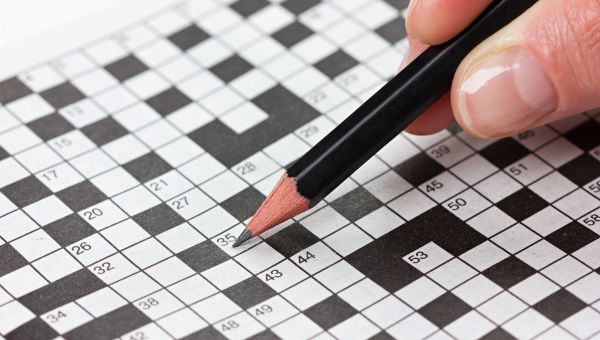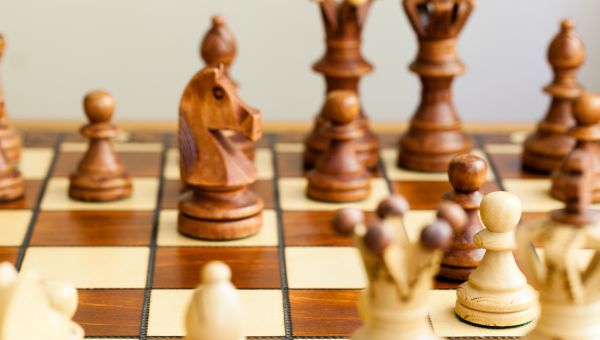Stay sharp with 6 easy brain games
Boost your memory and brain health—and even help prevent Alzheimer’s disease—playing these popular games.

Everyone has the occasional memory lapse, but if it seems to happen often, or you just want to keep your noggin in good working order, playing games is one fun way to improve cognitive skills, memory—and may even help prevent Alzheimer’s disease.
“If the brain isn’t getting the right amount of exercise, it’s at greater risk of exhibiting decreased mental function,” says recreational therapy specialist Olivia Griffith of TriStar Parthenon Pavilion in Nashville, Tennessee. Recreational therapy specialist Teresa Treloar of TriStar Parthenon Pavilion in Nashville, Tennessee suggests playing brain games for just a few minutes a day to help boost brain health. “Games are a great way to strengthen neural pathways in our brain to keep us mentally sharp,” she says.

Tetris
Tetris is a fast-paced, digital puzzle game that puts your problem-solving skills to the test. As different-sized blocks fall from the top of the screen, it’s your job to stack and move them to clear rows and earn points. According to Griffith, Tetris feeds the urge of completing unfinished tasks and aids in organizational skills. “Playing a game like Tetris even a couple of hours a week can enhance part of the brain, specifically the cerebral cortex, which helps make the brain more efficient,” says Griffith.
You can play Tetris for free on the web or download the app on your smartphone.

Crossword Puzzles
Crossword puzzles, a game in which words that match given clues are used to fill in a grid of horizontal and vertical squares, “can help slow down things such as memory loss and other cognitive impairments,” says Griffith. One 2014 study involving 488 elderly participants, found that those who played crossword puzzles delayed the onset of accelerated memory loss by about two and half years.
“Puzzles have also been shown to help strengthen pathways in our brain to keep us mentally sharp,” says Treloar. The next time you’re at the store, consider picking up a crossword puzzle book, or play online.

Sudoku
“Sudoku is a game where memory and logic work side-by-side, stimulating the brain’s concentration power and focus,” says Treloar. This popular game involves filling in blanks on a grid using the numbers one through nine—but it’s not as simple as it sounds! Sudoku’s rules challenge you to use the power of deduction to complete the puzzle. “Some of the best brain- boosting activities can be ones that require increased mental effort, where a person can challenge themselves by moving to the next level of difficulty,” says Treloar.

Chess and Checkers
Chess and checkers are similar board games that require strategy, logic and color/shape recognition, such as black and white tiles or playing pieces, to win the game. “Checkers and chess stimulate both the left and right hemispheres of the brain by recognizing the different colors and using logic to make the best move,” says Griffith. According to Griffith, these games also improve your memory, thanks to the visual stimuli and patterns you’re required to keep track of while playing.
Playing games requiring one or more partners has another brain-boosting benefit: “Human beings are social by nature,” says Treloar. “Interactions with other people are a big part of stimulating our thinking.”

Card Games
Playing card games like solitaire, poker and bridge can give your brain a great workout. “Anything that challenges you to think outside the box is a good way to increase your memory,” says Griffith. “Games with steps can help as well. If you're playing a game and step one, you have to do this, step two you have to do that, challenging your brain to remember those steps is good.” While there isn’t conclusive evidence that playing games prevents the onset of Alzheimer’s disease, some experts believe it can slow the onset of symptoms.

Name That Tune
“Music is a great way to enhance memory by memorizing lyrics to a song and certain notes,” says Griffith. It can help focus your attention and, given how we attach certain songs to favorite memories, music can help you better remember important information. One fun way to socialize with pals and give your brain a workout? Play a small part of a song, then take turns finishing the lyrics, guessing the tune’s name or the artist who performed it.
Treloar suggests that spending time with family and friends playing games that lend themselves laughter give your brain another boost. “Laughter also engages multiple regions in your brain,” she says.
More On


video

article

slideshow


video


video
